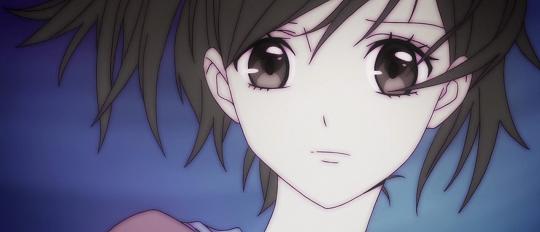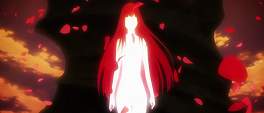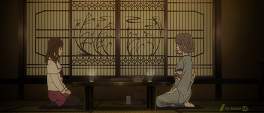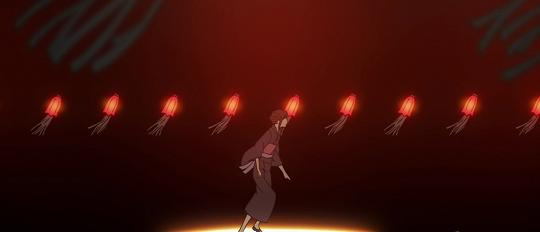Trying to encapsulate what Shinsekai Yori (From The New World) is "about" is tricky task. It's no more about a future where everyone has psychic powers than it is about human relationships with those weaker than themselves. That it is about so many big concepts is its greatest strength; its greatest weakness however is implementation. The three-volume source work is carved up and thrown together with the best of intentions, but the sheer scale and boldness of its ideas, story and direction means that the end result demands a lot of faith from the viewer.
If only those were the only flaws though. Critical plot points lurk like depth-charges: going off without warning and sending the narrative perilously askew; not helped by a clutch of critical but abstract notions (e.g. "death feedback") that are poorly elaborated upon in the early episodes. Those episodes though are a particular high-point: starting with an fascinatingly sinister atmosphere only to add memory manipulation and disappearing children to the mix; it's gripping stuff and a master-class on how to build tension. That uncomfortable feeling that not everything is as it seems never quite leaves, but as the core group of five age from tweens to teens to adults, the rules of the world become manifest and that oppressive aura gives way to personal drama.
Helped along by a pleasingly liberal view of homosexuality, the relationships that are nurtured in those early episodes provide the spine for the series climax. The final story arc relies on everything learned thus far to tell a story of rebellion, of revenge and sacrifice that although charged with emotion, lacks the personal and close-felt nature of what came before.
Key to the group of protagonists is Saki whose growth throughout is not only wholly believable but her empathetic stubbornness becomes a touchstone that is sorely absent when the story concerns itself with the fate of humanity. Contrast this with when she attended the final moments of one of her closest friends, set within a twisted landscape and scarred by technicolour psychic aurora, Saki made it a very private catastrophe. The audience is told that unfettered psychic power is more powerful than any nuclear weapon, but Saki's friendship made it personal and tragic rather than epic and unfeeling.
Whereas that scene is a reminder of just how bewitching the series' creativity can be, at other times it cripples an otherwise serviceable situation. Perhaps through hubris or budget saving necessity, episodes can devolve into multicoloured confusion, halfway between a fever dream and hyper-reality and laden with implied meanings and unresolved threads. There is obvious skill in evidence with sublime use contrast and imaginative framing, often though this is at the expense of fine detail with some sequences little more than animated scrawls.
It's a shame given that the series deserves the kind of quality that other studios seem to lavish on the most blisteringly mundane productions, however it's not entirely surprising given that the author's previous work, The Crimson Labyrinth, is similarly uninspiring. From The New World shares little with that novel except the worrying tendency for what a character guesses has happened to become gospel. It's sloppy exposition and breeds uncertainty through an unreliable narrator, but is the source of many of the series most confusingly ill-explained plot points.
The plot itself covers a vast swathe of themes, some brought to the fore by sidestories narrated by such characters as the phenomenal Tomiko, others lie worryingly dormant. The most prevalent though involves the Queerats or Monster Rats: deformed creatures who as the burakumin underclass live in servitude to the god-like psychic humans. Everything about the queerats is controlled, even down to battles between colonies that must first be approved before being carried out. Their inevitable ascension though mimics that of historical humans who, through knowledge and technology, overthrew their godly trappings. The reveal in the final episode is an affirmation of the injustice the queerats have been subject to but is not the ground-shaking upset the series perhaps wishes it to be.
Though the queerats live under direct control, a more subversive system of obedience is in place for the humans of Kamisu's 66th district as well. Experienced acutely by the protagonists, their development from children to adults promises to be a story of overturning that oppressive regime. Yet by the time the children recognise the bars of their gilded cage, they are already perpetuating the system and, crucially, understanding why it is in place. The bogeyman that stalked them from the shadows in their youth now laze indolently at their feet.
That growth by the characters is just one aspect out of many that makes Shinsekai Yori so superb. As the final episode ends and the personal narratives are tied up, there's a sigh of immense satisfaction at just how fulfilling it is to have watched Saki go from a shy youth to a strong and understated young woman. At times it can be difficult to follow, and elements that seem important aren't, while others that are, aren't given the gravity they need. For many other series - those without such powerful ideas behind them - these would be fatal failings. Here though, right from the outset there, is the feeling that this is something special. And, by and large, that feeling is justified. Some will no doubt stumble at episode five's chaotic narrative, or tune out when veiled threats never become manifest. They however will be missing out on what is, not quite a modern classic but, a rough hewn diamond that is as captivating and thought provoking as one could hope for from an otherwise unknown series.









